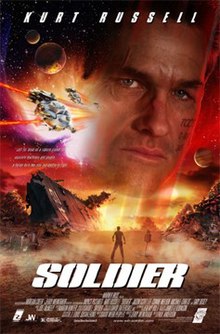
Rutger Oelsen Hauer was a Dutch actor. In 1999, he was named by the Dutch public as the Best Dutch Actor of the Century.

The Patriot is a 2000 American epic historical drama war film directed by Roland Emmerich and written by Robert Rodat. The film stars Mel Gibson, Heath Ledger, Joely Richardson, Jason Isaacs, Chris Cooper, and Tom Wilkinson. Set in Berkeley County, South Carolina, it follows Benjamin Martin (Gibson), an American colonist opposed to going to war with Great Britain but, along with his son Gabriel (Ledger), gets swept into the American Revolutionary War when his home life is disrupted, and one of his sons is murdered by a cruel British officer (Isaacs). Rodat has said Martin is a composite character based on four historical men: Andrew Pickens, Francis Marion, Daniel Morgan and Thomas Sumter.

Sir Michael Caine is an English retired actor. Known for his distinctive Cockney accent, he has appeared in more than 160 films over a career that spanned eight decades and is considered a British film icon. He has received numerous awards including two Academy Awards, a BAFTA Award, three Golden Globe Awards, and a Screen Actors Guild Award. As of 2017, the films in which Caine has appeared have grossed over $7.8 billion worldwide. Caine is one of only five male actors to be nominated for an Academy Award for acting in five different decades. In 2000, he received a BAFTA Fellowship and was knighted by Queen Elizabeth II.
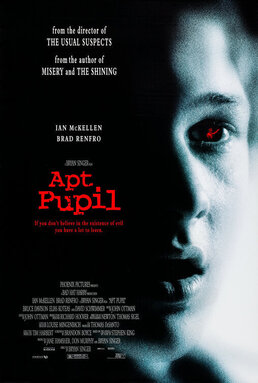
Apt Pupil is a 1998 American thriller film directed by Bryan Singer and starring Ian McKellen and Brad Renfro. It is based on the 1982 novella of the same name by Stephen King. In the 1980s in southern California, high school student Todd Bowden (Renfro) discovers fugitive Nazi war criminal Kurt Dussander (McKellen) living in his neighborhood under the pseudonym Arthur Denker. Bowden, obsessed with Nazism and acts of the Holocaust, persuades Dussander to share his stories, and their relationship stirs malice in each of them.

Kurt Vogel Russell is an American actor. At the age of 12, he began acting in the western series The Travels of Jaimie McPheeters (1963–1964). In the late 1960s, he signed a ten-year contract with The Walt Disney Company, where he starred as Dexter Riley in films such as The Computer Wore Tennis Shoes (1969), Now You See Him, Now You Don't (1972), and The Strongest Man in the World (1975). For his portrayal of rock and roll superstar Elvis Presley in Elvis (1979), he was nominated for the Primetime Emmy Award for Outstanding Lead Actor in a Limited or Anthology Series or Movie. According to Robert Osborne of Turner Classic Movies, Russell became the studio's top star of the 1970s.

Good Burger is a 1997 American teen comedy film directed by Brian Robbins, written by Dan Schneider with Kevin Kopelow and Heath Seifert, and starring Kenan Thompson and Kel Mitchell. The film is a spin-off of the "Good Burger" comedy sketch from the Nickelodeon variety series All That, with Mitchell reprising his role as Ed. The story follows Dexter Reed, a high school student who takes a job at a fast-food restaurant called Good Burger to pay off the damages he made to his teacher's car as he and Ed, his dimwitted co-worker, stumble upon an evil plot by a newly-opened rival fast-food restaurant across the street.
Rex Applegate was an American military officer who worked for the Office of Strategic Services, where he trained Allied special forces personnel in close-quarters combat during World War II. He held the rank of colonel.

Escape from L.A. is a 1996 American post-apocalyptic action film co-written, co-scored, and directed by John Carpenter, co-written and produced by Debra Hill and Kurt Russell, with Russell also starring as Snake Plissken. A sequel to Escape from New York (1981), Escape from L.A. co-stars Steve Buscemi, Stacy Keach, Bruce Campbell, Peter Fonda, and Pam Grier. Escape from L.A. failed to meet the studio's expectations at the box office and received polarized reactions from critics. The film later found a strong cult following.

Jason Scott Lee is an American actor and martial artist. He played Mowgli in Disney's 1994 live-action adaptation of The Jungle Book and Bruce Lee in the 1993 martial arts film Dragon: The Bruce Lee Story.

We Were Soldiers is a 2002 American war film written and directed by Randall Wallace and starring Mel Gibson. Based on the book We Were Soldiers Once… and Young (1992) by Lieutenant General (Ret.) Hal Moore and reporter Joseph L. Galloway, it dramatizes the Battle of Ia Drang on November 14, 1965.
David Webb Peoples is an American screenwriter who wrote Blade Runner (1982), Unforgiven (1992), and 12 Monkeys (1995). He has been nominated for Oscar, Golden Globe, and BAFTA awards. He won the best screenplay awards from the L.A. Film Critics (1991) and National Society of Film Critics (1992) for Unforgiven.

"Tears in rain" is a 42-word monologue, consisting of the last words of character Roy Batty in the 1982 Ridley Scott film Blade Runner. Written by David Peoples and altered by Hauer, the monologue is frequently quoted. Critic Mark Rowlands described it as "perhaps the most moving death soliloquy in cinematic history", and it is commonly viewed as the defining moment of Hauer's acting career.
"The Chameleon" is an episode of the original The Outer Limits television show. It first aired on 27 April 1964, during the first season.
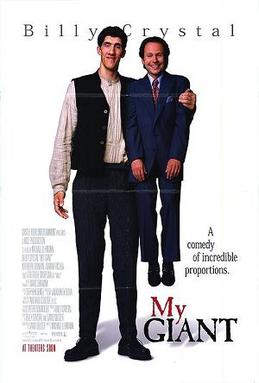
My Giant is a 1998 American comedy drama film directed by Michael Lehmann. The film stars Billy Crystal, who also produced and co-wrote the story for the film, and Romanian NBA player Gheorghe Mureșan in his debut film appearance. David Seltzer's script was inspired by Crystal's friendship with professional wrestler André the Giant, whom he had met during the filming of The Princess Bride.

Elvis is a 1979 American made-for-television biographical film aired on ABC. It was directed by John Carpenter and starring Kurt Russell as Elvis Presley. It marked the first collaboration between Carpenter and Russell.

Death Proof is a 2007 American action slasher film written and directed by Quentin Tarantino. It stars Kurt Russell as a stuntman who murders young women with modified cars he purports to be "death-proof". Rosario Dawson, Vanessa Ferlito, Jordan Ladd, Rose McGowan, Sydney Tamiia Poitier, Tracie Thoms, Mary Elizabeth Winstead, and Zoë Bell co-star as the women he targets.
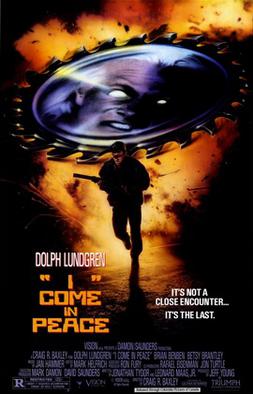
I Come in Peace is a 1990 American science fiction action film directed by Craig R. Baxley, and starring Dolph Lundgren, Brian Benben, Betsy Brantley and Matthias Hues. The film was released in the United States on September 28, 1990.

War for the Planet of the Apes is a 2017 American science fiction action film directed by Matt Reeves, who co-wrote it with Mark Bomback. The sequel to Dawn of the Planet of the Apes (2014), it is the third installment in the Planet of the Apes reboot franchise and the ninth film overall. It stars Andy Serkis as Caesar, alongside Woody Harrelson and Steve Zahn. The film takes place two years after the events of Dawn and follows the conflict between apes and humans as it has escalated into full war, while Caesar sets out to avenge those he has lost.
Blade Runner is an American science fiction media franchise originating from the 1968 novel Do Androids Dream of Electric Sheep? by Philip K. Dick, about the character of Rick Deckard. The book has been adapted into several media, including films, comics, a stage play, and a radio serial. The first film adaptation was Blade Runner, directed by Ridley Scott in 1982. Although the film initially underperformed at the American box office, it became a cult classic, and has had a significant influence on science fiction. A novelization and a comic adaptation of the film were released in the same year. From 1995 to 2000, three novels serving as sequels to both Blade Runner and the original novel were written by K. W. Jeter, a friend of Dick's. A film sequel to Blade Runner, Blade Runner 2049, was released in 2017. To celebrate the 30th anniversary of Blade Runner in 2012, a short film was released, and in the lead up to the release of Blade Runner 2049, several more short films detailing events that occurred between 2019 and 2049 were released. The influence of the franchise has helped spawn the cyberpunk genre.
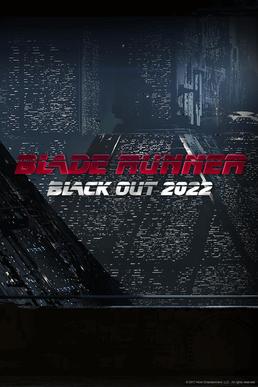
Blade Runner Black Out 2022 is a 2017 anime short film directed by Shinichiro Watanabe and animated by Cygames Pictures. The short is one of three short films, that serve as prequels to the live-action film Blade Runner 2049. It debuted on 27 September 2017 on Crunchyroll.
